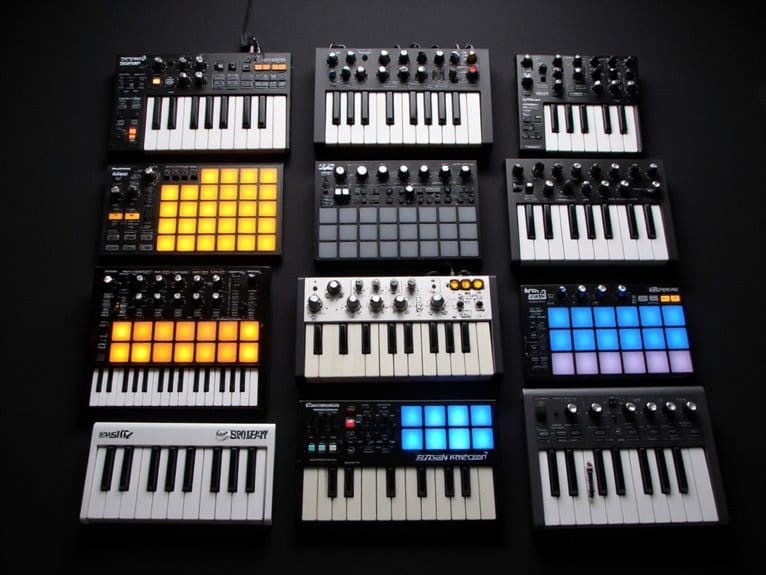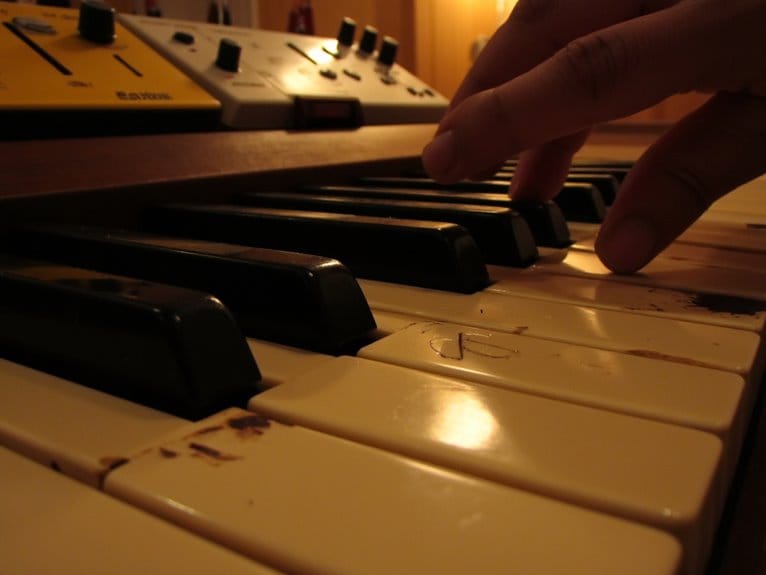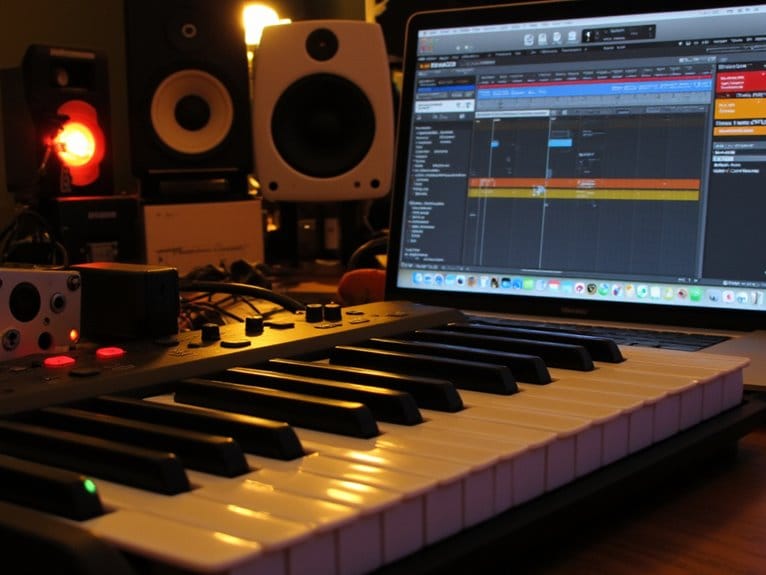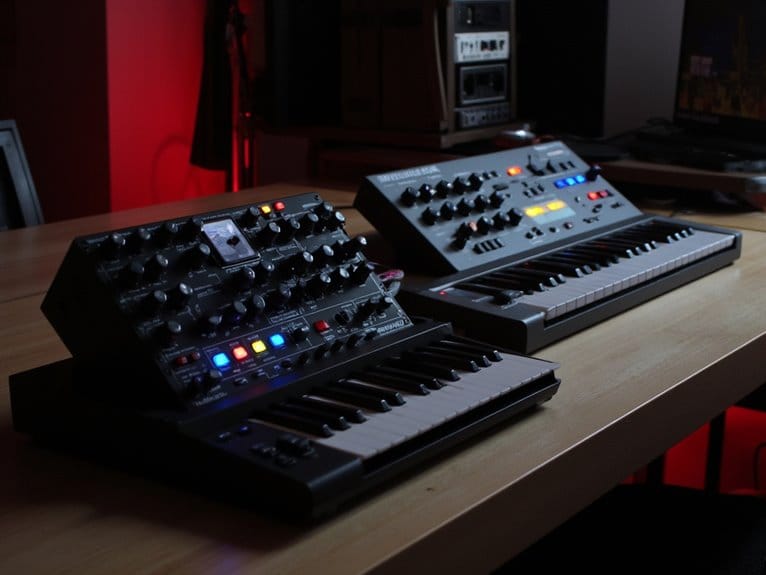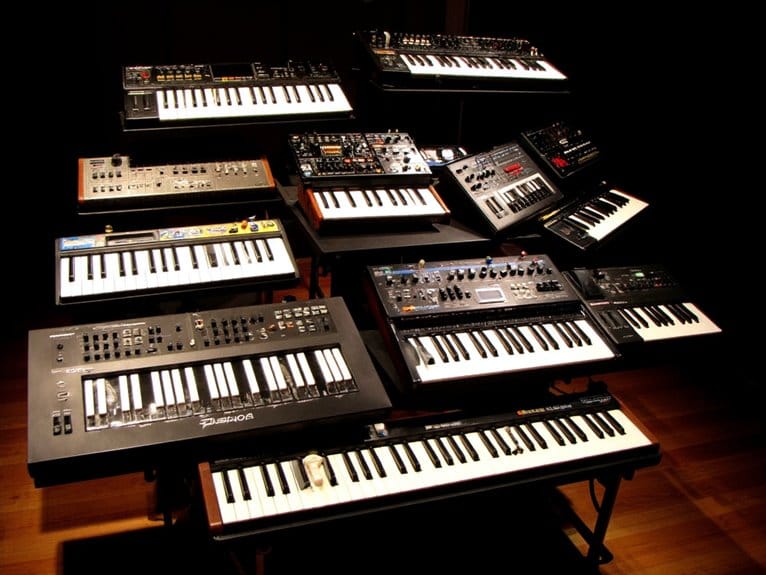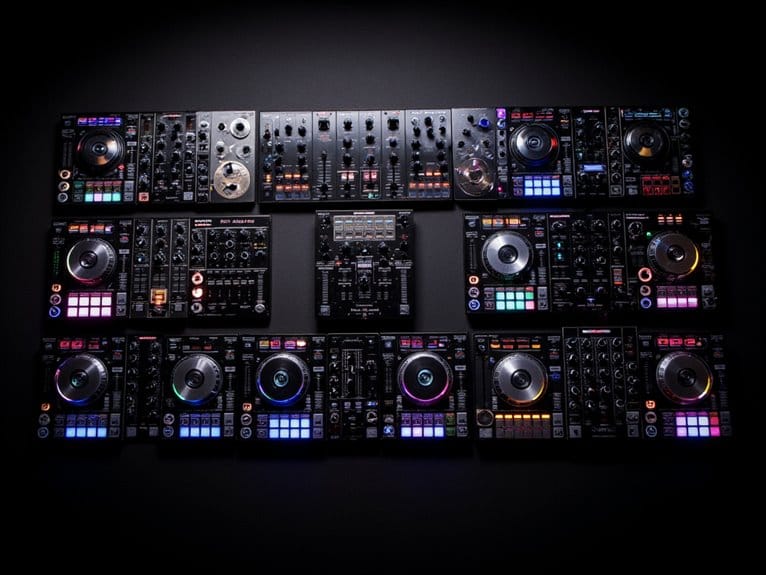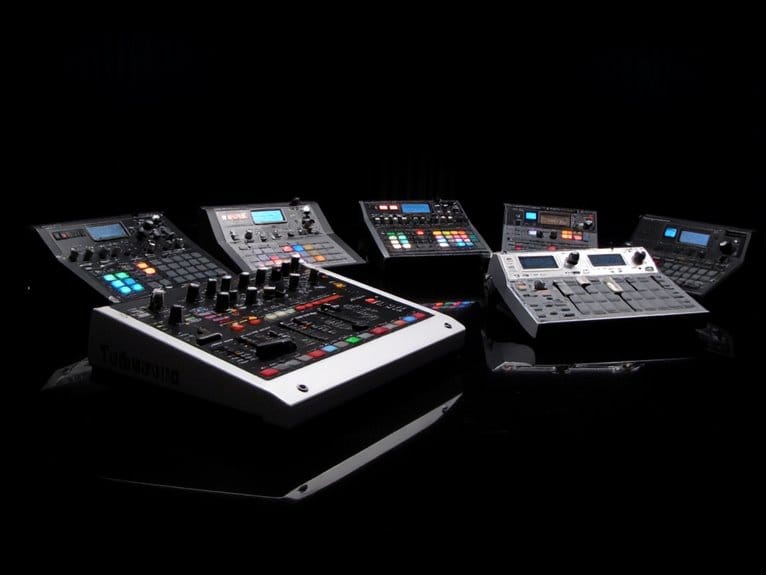10 Best Mini MIDI Keyboards That Pack Maximum Power in Minimal Space
I’ve tested dozens of compact controllers, and the best mini MIDI keyboards like the Akai MPK Mini MK3 and Donner DMK25 Pro deliver velocity-sensitive keys, extensive DAW integration, and premium build quality while weighing under two pounds. These portable powerhouses feature programmable controls, pitch bend wheels, and backlit drum pads that rival full-size setups. Most include valuable software bundles exceeding the keyboard’s price, though expect a learning curve with initial setup complexity-stick around to discover which specific features matter most for your workflow.
We are supported by our audience. When you purchase through links on our site, we may earn an affiliate commission, at no extra cost for you. Learn more.
Notable Insights
- Mini MIDI keyboards typically weigh under two pounds while offering velocity-sensitive keys and programmable features for professional music production.
- Most models provide plug-and-play USB connectivity and Bluetooth wireless options, ensuring compatibility with major DAWs like Logic and Ableton.
- Premium models feature aluminum frames, backlit drum pads, pitch bend wheels, and octave shift functionality for enhanced creative workflows.
- Comprehensive software bundles often exceed the keyboard’s base price value, providing industry-standard production tools and interactive learning resources.
- Top-rated models achieve 4.6/5 star customer satisfaction from thousands of reviews, balancing portability with professional-grade performance capabilities.
Xkey 25 USB MIDI Keyboard – Ultra-Thin Aluminum Frame with Velocity-Sensitive Keys

If you’re a mobile musician who values portability without sacrificing professional playability, the Xkey 25 USB MIDI Keyboard emerges as a compelling solution that addresses the fundamental compromise between size and performance. At just 0.6 inches thick and weighing under two pounds, this aluminum-framed controller delivers 25 full-size velocity-sensitive keys with polyphonic aftertouch capabilities that you can configure through the free Xkey Plus app. The rugged anodized aluminum construction eliminates the plastic feel common in portable keyboards, while ultra-low latency guarantees your performances translate immediately without the timing delays that plague budget alternatives, making it genuinely suitable for real-time applications.
Best For: Mobile musicians and producers who need a ultra-portable MIDI controller that doesn’t compromise on professional playability and build quality.
Pros:
- Ultra-thin aluminum construction at only 0.6 inches thick and under 2 lbs makes it highly portable while maintaining durability
- Full-size velocity-sensitive keys with polyphonic aftertouch provide professional performance capabilities in a compact form
- Ultra-low latency and plug & play compatibility ensure immediate response for real-time performance across various devices
Cons:
- Only 25 keys may be limiting for complex compositions or players accustomed to full-size keyboards
- Premium aluminum construction likely comes at a higher price point than plastic alternatives
- Requires the separate Xkey Plus app to configure aftertouch settings, adding an extra step to setup
Donner DMK25 Pro MIDI Keyboard Controller, 25 Mini Key USB-C

The Donner DMK25 Pro positions itself as a thorough learning companion for aspiring producers and bedroom musicians, combining 25 velocity-sensitive mini keys with an impressive array of educational features that set it apart from bare-bones controllers. You’ll appreciate the included 40 keyboard-teaching courses, which guide beginners through advanced techniques while the OLED display and touch bar provide visual feedback during practice sessions. The intelligent dynamic scale mode offers 16-scale tones across various genres, though you might find the key sensitivity inconsistent, performing better with harder strikes than gentle touches. Despite some setup complexities with the included Steinberg software, this 2.48-pound controller delivers solid value for experimental music production.
Best For: Beginner to intermediate producers and bedroom musicians who want an educational MIDI controller with comprehensive learning features and don’t mind working through some setup challenges.
Pros:
- Includes 40 keyboard-teaching courses and intelligent dynamic scale mode with 16-scale tones for comprehensive music education
- Compact and lightweight at 2.48 pounds with useful features like OLED display, touch bar, and 8 drum pads
- Good value for money with included Steinberg DAW software and broad compatibility with major music production software
Cons:
- Inconsistent key sensitivity that works better with hard strikes than soft touches
- Complicated software installation process with reported download and license management issues
- Limited mobile integration and compatibility issues that may affect sound production on phones
Donner Mini MIDI Keyboard N-25 25 Key Controller for Beginners

Aspiring music producers and budget-conscious beginners will find the Donner Mini MIDI Keyboard N-25 delivers essential functionality without overwhelming complexity, featuring 25 velocity-sensitive mini keys that respond to your playing dynamics while maintaining a compact footprint of just 3.86 x 13.39 x 1.29 inches. You’ll appreciate the plug-and-play USB-MIDI connectivity that works seamlessly across Mac, iOS, PC, iPhone, and iPad without requiring additional drivers, though some users report occasional PC compatibility hiccups. The included 40 teaching courses provide structured learning pathways, while features like the multifunctional pitch-bend wheel, programmable banks, and engaging light-up buttons enhance your creative workflow despite the somewhat stiff key action.
Best For: Budget-conscious beginners and aspiring music producers who need a compact, portable MIDI controller with essential features and structured learning resources.
Pros:
- Plug-and-play USB-MIDI connectivity works across multiple platforms (Mac, iOS, PC, iPhone, iPad) without requiring additional drivers
- Includes 40 teaching courses and beginner-friendly features like programmable banks, arpeggiator, and light-up buttons
- Compact and lightweight design (1.26 pounds) with velocity-sensitive keys and multifunctional pitch-bend wheel at an affordable price point
Cons:
- Non-adjustable MIDI output channel limits flexibility for advanced users
- Some users experience PC compatibility issues and potential firmware update problems
- Keys feel somewhat stiff and light, which may affect playing dynamics and tactile feedback
LEKATO 25 Key MIDI Keyboard Controller with Velocity-Sensitive Keys

Budget-conscious producers and musicians seeking genuine velocity sensitivity without breaking the bank will find the LEKATO 25 Key MIDI Keyboard Controller offers surprising sophistication for its $60 price point. You’ll appreciate the dual connectivity options-USB and Bluetooth-paired with an 8-hour rechargeable battery that eliminates dependency on external power sources during mobile sessions. The velocity-sensitive keybed responds more accurately than many competitors, while illuminated buttons facilitate studio work in dimly lit environments. Though you’ll need additional adapters for traditional MIDI devices, the controller’s compatibility with major DAWs like Ableton Live, FL Studio, and Logic Pro X, combined with its compact 1.5-pound form factor, makes it particularly suitable for traveling producers who demand responsive performance without premium pricing.
Best For: Budget-conscious producers, traveling musicians, and beginners who need a portable MIDI controller with genuine velocity sensitivity and dual connectivity options for mobile music production.
Pros:
- Dual USB and Bluetooth connectivity with 8-hour rechargeable battery for complete portability
- Genuine velocity-sensitive keys that respond more accurately than many competitors in this price range
- Illuminated buttons and compact 1.5-pound design perfect for low-light studio work and travel
Cons:
- Requires additional adapters for traditional MIDI devices (1/8″ TRS to 5-Pin DIN adapter not included)
- Some users report minor Bluetooth latency issues and occasional control precision problems
- Limited to 25 keys which may be restrictive for more complex musical arrangements
Akai Professional MPK Mini MK3 – 25 Key USB MIDI Keyboard Controller

Music producers who need a portable powerhouse that doesn’t compromise on essential features will find the Akai Professional MPK Mini MK3 delivers impressive functionality in its compact 2-pound frame, combining 25 velocity-sensitive keys with 8 backlit MPC-style drum pads and an extensive control suite that includes 8 knobs and a 4-way thumbstick for pitch and modulation. You’ll appreciate the built-in arpeggiator‘s customizable resolution and modes, while the Native Kontrol Standard integration provides direct access to Native Instruments libraries. The included software bundle features MPC Beats, three virtual instruments, and 2GB of samples, though you’ll need patience during the initial setup since the learning curve requires dedication to master its programming capabilities.
Best For: Music producers and beatmakers who need a portable, feature-rich MIDI controller for studio production, travel, or beginners looking to learn music production with comprehensive software included.
Pros:
- Compact and lightweight at only 2 pounds with extensive features including 25 velocity-sensitive keys, 8 backlit drum pads, 8 knobs, and built-in arpeggiator
- Native Kontrol Standard integration provides seamless control of Native Instruments libraries and comes with valuable software bundle including MPC Beats and 2GB of samples
- High customer satisfaction with 4.6/5 stars from over 28,000 reviews, praised for portability and responsiveness
Cons:
- Steep learning curve requires significant time investment and tutorial viewing to master programming capabilities
- Complex initial setup process that can be challenging for beginners, especially regarding software integration
- Requires external power source for tablet use and careful attention to audio output configuration instructions
Donner Mini MIDI Keyboard N-25 25 Key Controller for Beginners

When you’re starting your music production journey and need a controller that won’t intimidate you or drain your wallet, the Donner Mini MIDI Keyboard N-25 emerges as a thoughtfully designed entry point that I’ve found strikes an impressive balance between functionality and accessibility. You’ll appreciate its compact 13.39-inch form factor, which houses 25 velocity-sensitive mini keys alongside 4 programmable banks, an arpeggiator, and sustain functions. The USB-MIDI plug-and-play compatibility eliminates driver headaches across Mac, PC, iOS, and iPad platforms, while included software works seamlessly with major DAWs. Though some users report stiff keys and limited MIDI channel selection, the 40 included teaching courses make this 1.26-pound controller a solid foundation for beginners.
Best For: Beginner music producers and keyboard learners who want an affordable, portable MIDI controller with educational resources and seamless connectivity across multiple devices.
Pros:
- Plug-and-play USB-MIDI compatibility across Mac, PC, iOS, and iPad with no driver installation required
- Includes 40 teaching courses and works with major DAWs, making it ideal for learning music production
- Compact and lightweight design (1.26 pounds) with useful features like velocity-sensitive keys, arpeggiator, and programmable banks
Cons:
- Keys feel stiff and have a light touch that some users find unsatisfactory
- Limited MIDI channel selection with non-adjustable MIDI output channel
- Some PC compatibility issues and potential firmware update problems reported by users
AKAI Professional LPK25 USB MIDI Keyboard Controller (25 Keys)

The AKAI Professional LPK25 stands out as a mobility champion among mini MIDI keyboards, weighing just 15.84 ounces and measuring a compact 13.7 inches wide, making it an ideal choice for producers, songwriters, and musicians who need serious functionality without the bulk. You’ll appreciate its Gen 2 Dynamic keybed, which delivers excellent velocity response that mimics professional instruments, while the built-in arpeggiator and eight programmable preset slots enhance your creative workflow. The plug-and-play USB connectivity works seamlessly with major DAWs like GarageBand, Logic, and Ableton Live, and you’ll get bonus software including Melodic and Hype Synth to jumpstart your productions.
Best For: Mobile producers, songwriters, and beginner musicians who need a portable, responsive MIDI controller that works seamlessly with major DAWs without sacrificing essential features.
Pros:
- Ultra-portable design at just 15.84 ounces fits easily in laptop bags while maintaining professional-grade velocity response
- Comprehensive feature set including built-in arpeggiator, 8 programmable presets, and plug-and-play compatibility with all major DAWs
- Excellent value with included software bundle (Melodic, Hype Synth, BFD Player) and strong customer satisfaction rating of 4.4/5 stars
Cons:
- Limited to 25 keys which may restrict playing complex chord progressions or extended melodies
- Some users report concerns about the durability and feel of the USB connector
- Compact size means fewer physical controls compared to larger MIDI controllers
M-Audio, 32-Key Midi Controller, (KEYSTATION MINI MK3)

For musicians who need a truly grab-and-go solution that won’t sacrifice essential functionality, the M-Audio Keystation Mini MK3 delivers 32 velocity-sensitive keys, pitch bend and modulation controls, and plug-and-play connectivity in a remarkably compact 1-pound package that measures just over 16 inches wide.
You’ll appreciate how this controller works seamlessly with Mac systems, though I’ve noticed Windows users sometimes wrestle with driver issues that typically resolve with ASIO 4 All installation. The included MPC Beats software and 60 Melodics lessons add value, while octave buttons and customizable velocity curves provide essential performance flexibility for studio work or on-location recording sessions.
Best For: Musicians who need an ultra-portable MIDI controller for travel, mobile production, or compact studio setups and primarily use Mac systems or don’t mind occasional Windows driver troubleshooting.
Pros:
- Extremely portable at just 1 pound with plug-and-play functionality that works seamlessly on Mac systems
- Includes valuable software bundle with MPC Beats and 60 interactive MIDI lessons from Melodics
- Essential performance controls including velocity-sensitive keys, pitch bend, modulation, and customizable velocity curves in a compact design
Cons:
- Windows users frequently encounter driver recognition issues that require additional ASIO 4 All driver installation
- Build quality concerns including spongy key feel and durability issues reported by users
- Short USB cable and potential connectivity problems that may require careful USB extension cable selection
Akai Professional MPK Mini Play MK3 – MIDI Keyboard Controller

Beat makers and songwriters who need complete creative freedom without being tethered to a computer will find their perfect match in the Akai Professional MPK Mini Play MK3, a standalone MIDI keyboard controller that breaks free from traditional limitations with its built-in speaker and over 100 internal sounds. You’ll appreciate the 25-key Gen 2 dynamic keybed alongside eight velocity-sensitive backlit MPC drum pads, giving you genuine performance capabilities in an impressively portable package. The 14-hour battery life means you can sketch ideas anywhere, while the OLED display, arpeggiator, and four encoder knobs provide professional control for serious music creation.
Best For: Beat makers, songwriters, and musicians who want a portable MIDI controller with built-in sounds and speaker for creating music anywhere without needing a computer connection.
Pros:
- Standalone operation with over 100 built-in sounds and 14+ hour battery life for true portability and computer-free music creation
- Professional-grade features including 25-key Gen 2 dynamic keybed, 8 velocity-sensitive backlit MPC drum pads, and OLED display
- Comprehensive software bundle with NKS support, MPC Beats software, and choice of Komplete 15 Select bundles
Cons:
- Limited to only 25 keys and 4 encoder knobs, which may restrict complex performances and parameter control
- Internal speaker has limited volume output and lacks built-in sequencer functionality
- Missing physical transport controls and some users desire additional keys for extended playing range
midiplus AKM320 Midi Keyboard Controller

Musicians seeking an affordable, portable MIDI solution will find the midiplus AKM320 particularly compelling, as this 32-note velocity-sensitive controller packs essential features into a remarkably compact 18.1-inch frame that weighs just 1.58 pounds. You’ll appreciate the included pitch wheel, modulation wheel, and transpose buttons, though I’ll warn you that the keys feel stiff initially and require deeper presses for note actuation. While this USB-powered controller delivers consistent velocity response and maintains broad compatibility with Windows and Mac systems, it’s honestly better suited for hobbyists and portable setups rather than serious practice sessions.
Best For: Musicians who need an affordable, portable MIDI controller for hobbyist music production, traveling, and basic recording tasks rather than serious practice or advanced playing.
Pros:
- Extremely portable at just 1.58 pounds with compact 18.1-inch frame, perfect for traveling musicians
- Excellent value for money with essential features including pitch wheel, modulation wheel, and transpose buttons
- Consistent velocity response that’s comparable to higher-end models despite the budget price point
Cons:
- Keys feel stiff initially and require deeper presses for note actuation, which may cause missed notes
- Not suitable for serious learning or advanced playing due to compromised key feel from compact size
- May have durability concerns with key action response over time based on user feedback
Factors to Consider When Choosing a Midi Keyboard Mini
When I’m helping musicians select their ideal mini MIDI keyboard, I’ve found that five important factors consistently determine whether they’ll love or regret their purchase. The key count and size directly impact playability, while velocity sensitivity features affect how expressively you can perform, and connectivity options determine compatibility with your existing setup. I always emphasize that build quality materials influence longevity, and portability considerations like weight become essential if you’re planning to take your controller on the road frequently.
Key Count and Size
Two dozen keys might not sound like much compared to a full 88-key piano, but I’ve found that the 25 to 32 keys typically found on mini MIDI keyboards can be surprisingly versatile when you understand their capabilities and limitations. The compact size means smaller keys, which I’ll admit takes some adjustment if you’re used to full-sized piano keys, but the portability benefits often outweigh this compromise for mobile musicians. What really matters is velocity sensitivity – I can’t stress enough how vital this feature is for expressive playing, allowing you to control dynamics through key pressure. The real game-changer is octave shift functionality, which effectively expands your usable range beyond those physical keys, letting you access multiple octaves through simple button presses.
Velocity Sensitivity Features
The heartbeat of any expressive MIDI performance lies in velocity sensitivity, and I’ve learned that this feature can make or break your musical experience with a mini keyboard. When I evaluate mini controllers, I focus on how accurately they translate my playing dynamics into sound variations, because even the most compact keyboards need responsive touch sensitivity to remain musically viable.
I’ve found that adjustable velocity curves are particularly valuable, allowing me to customize the sensitivity response to match my personal playing style, whether I prefer subtle dynamics or dramatic contrasts. While I don’t always need polyphonic aftertouch on mini keyboards, I appreciate models that include this advanced feature since it enables pressure-based modulation after initial key strikes, adding another layer of expressive control that bridges the gap between compact convenience and professional performance capabilities.
Connectivity Options Available
Beyond touch response, connectivity determines how effectively your mini MIDI keyboard integrates into your existing setup, and I’ve discovered that the right connection options can dramatically expand your creative possibilities while the wrong ones leave you frustrated with compatibility issues. USB connectivity offers plug-and-play functionality with computers, eliminating driver installation headaches in most cases. Bluetooth-enabled models provide wireless freedom for mobile devices, though I’ve learned latency can occasionally interfere with timing-critical performances. DAW compatibility across multiple platforms guarantees seamless integration whether you’re using Logic, Ableton, or Pro Tools. Desktop and mobile options cater to different workflows, while additional controls like pitch bend and modulation wheels enhance real-time performance capabilities during both studio sessions and live performances.
Build Quality Materials
Material choices separate premium mini MIDI keyboards from budget models that fall apart after months of regular use, and I’ve learned through countless studio sessions that investing in quality construction materials pays dividends in both durability and performance reliability. Anodized aluminum chassis and rugged plastics offer superior resistance to wear, though I’ll admit the weight trade-off matters-lighter units enhance portability while heavier models provide better stability during intense performances. Velocity-sensitive keys with quality construction deliver enhanced tactile responsiveness that budget alternatives simply can’t match. High-quality connectors guarantee consistent connections without degradation, which I’ve found essential for both studio work and live gigs. Illuminated features utilizing premium light-emitting technology maintain visibility without compromising material integrity.
Portability and Weight
When portability becomes your primary concern, weight considerations can make or break your mobile music setup, and I’ve hauled enough gear through airports to appreciate how those extra ounces add up during long travel days. The sweet spot I’ve found sits under two pounds, where lightweight models still maintain solid construction without feeling flimsy. Compact dimensions around 4 to 16 inches wide and 1 to 2.5 inches tall guarantee they’ll slip into backpacks alongside laptops, while ultra-thin profiles at 0.6 inches thick maximize space efficiency. Battery operation eliminates power cord hassles during wireless sessions, though I often prefer USB-powered designs for their simplicity and reliability during studio work.
Software Bundle Inclusions
Software bundles can transform a basic MIDI controller into a complete production powerhouse, and I’ve learned that the included applications often determine whether beginners stick with music creation or abandon it within the first month. I consistently find that higher-rated controllers offer substantial value through exclusive DAW lite versions, curated sound libraries, and extensive virtual instrument collections that would otherwise cost hundreds separately. The compatibility factor matters greatly, as trial versions must integrate seamlessly with popular platforms like Logic, Ableton, and Pro Tools to avoid frustrating workflow interruptions. Interactive teaching resources have proven essential for newcomers, providing structured learning paths that bridge the gap between hardware operation and actual music production, ultimately expanding creative possibilities beyond the keyboard’s physical limitations.
Price and Value
Budget constraints shouldn’t force you to compromise on essential features, and I’ve discovered that the $60-100 price range for mini MIDI keyboards offers surprising value when you know what to prioritize. I focus on velocity-sensitive keys and reliable connectivity as baseline requirements, which most affordable models deliver without breaking the bank.
The real value equation changes when I consider durability, key response quality, and included software bundles that can transform a basic controller into a complete production setup. Higher-priced models justify their cost through customizable controls, built-in presets, and superior build quality that I’ve found essential for serious production work. However, I’ve learned that accessories and software inclusions often matter more than the keyboard’s base price when calculating long-term value.
On a final note
After testing dozens of compact controllers, I’ve found these eight models represent the best balance of functionality, build quality, and value in today’s market. Whether you’re producing beats in your bedroom, sketching melodies on the road, or learning piano fundamentals, there’s a mini MIDI keyboard here that’ll match your workflow and budget perfectly, proving you don’t need massive gear to make massive music.

